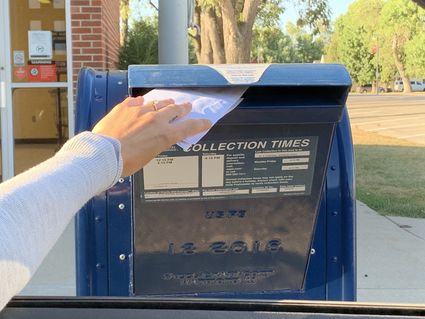Over Morning Coffee
Should the mailbox become the ballot box?
September 3, 2020

NICK PEDLEY/SENTINEL-NEWS
The COVID-19 pandemic will create more demand for absentee ballots this November.
Two months from today, Americans will vote in what is arguably the most important election in our lifetime. Yet, 62 days out, the ballot is awash in a sea of controversy. Due to safety concerns during the pandemic, many do not want to go to the polls and prefer to vote by mail instead. With the future of this country at stake, we must ask ourselves if the mailbox can be a reliable substitute for the ballot box.
There are two ways to cast a ballot by mail: Universal mail-in voting and absentee voting. Many assume they are the same, but they are not. While both ballots are exactly alike, the processes for obtaining them differ. To vote in absentia, registered voters must request a ballot and prove their identity. To obtain a universal mail-in ballot, registered voters need not do anything because they will automatically receive a ballot in the mail.
Absentee voting is not new. It started during the Civil War with Union soldiers who wanted to vote while away from home. In every state where absentee voting is allowed, registered voters must request a ballot in writing and provide identification, such as a Social Security number, along with a valid signature. Absentee voting has served us well for over a century.
Universal mail-in voting, on the other hand, is a new and relatively untried process. Ballots are sent to every registered voter in the state, whether they are planning to vote, or not. Since there is no need to request a ballot or provide security information, it is rife with potential problems. To quote David Axelrod, "Anytime you have loose ballots, you have to worry about shenanigans."
The integrity and reliability of the USPS has been in the news recently, with inflammatory tweets from the president countered by Democrats hurling accusations of mail slowdowns and equipment removal to suppress the vote. Postmaster General Louis DeJoy ordered a stop to any further changes before the election, and assured the public that the USPS is ready to handle the election surge in mail. Let us, therefore, assume this problem will resolve itself.
More worrisome is the chain of custody, which, according to the U.S. Election Assistance Commission, is "the device that demonstrates the progression and integrity of the ballot from its original creation to its final destination." With mail-in voting, the chain of custody breaks down when there is no mechanism to confirm the voter's identity. This leaves the voting process wide-open to fraud.
Official ballots may be erroneously sent to old addresses, nursing home residents no longer capable of voting, people ineligible to vote, or even deceased voters. The Pew Research Center estimates one in eight voter registrations nationwide is outdated. In Las Vegas, for example, 1.3 million ballots were mailed to voters, but hundreds of thousands of them were sent to the wrong address or not delivered at all. In elections where universal mail-in voting has been tried, official ballots could be seen littering hallways of apartment buildings and tossed in bundles near trashcans.
Jason Snead is the executive director of the Honest Elections Project, a nonpartisan, nonprofit watchdog group. He calls universal mail-in voting "unnecessary and risky." Snead is concerned about ballot harvesting – a fraudulent process that uses a third party to collect ballots by threatening or bribing voters to vote a certain way. A political operative in North Carolina was recently found guilty of running a ballot harvesting operation to help a congressional candidate.
Of even graver concern than fraud is a possible constitutional crisis. Election officials in battleground states warn that it will take days to count the massive number of mail-in ballots. Election results may not be known until well after November 3. Calls for recounts will result in challenges by both parties. This could drag on for weeks, even months. Lawsuits in even one state can throw the entire national election into disarray. Who can forget the hanging chads in Florida in 2000?
The 20th Amendment to the Constitution sets the term of the president. If a president-elect has not been declared by January 20, Congress shall then name the person who will serve as interim president. Should that happen after this election, the majority party in the House will choose the interim president, most likely the speaker. Our country will face a constitutional crisis unlike any we've ever seen.
Voting at the polls on Election Day remains the traditional and most secure way to vote, with absentee voting as an alternative for those who choose not to vote in-person. Universal mail-in voting should not be an option. None other than Dr. Anthony Fauci says "there's no reason" in-person voting shouldn't be safe with masks and proper social distancing. Considering the magnitude of the upcoming election, the mailbox should not be the ballot box.
Bonnie Ewoldt, of rural Milford, is a retired teacher, news junkie and freelance writer. Her opinion pieces have appeared online and in newspapers across Iowa and neighboring states. Visit her blog at http://www.bonniesblogbox.wordpress.com.


